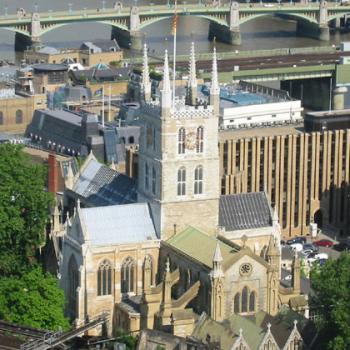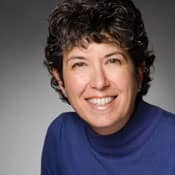As you've written this history, the Holocaust is the turning point. Does it remain the defining moment in the Jewish imagination? both in America and in Israel?
Yes, definitely. We see this most recently in responses to the death of Elie Wiesel who, if Jews had saints, would be declared one. (I don't approve of this 'beatification,' but I am describing the response to Wiesel's death.) Part of the key to the conversation about modern Jewish identity is the word holocaust itself, which is a problematic word. The word actually means "consumed by fire and destroyed" as a sacrifice. It comes from the Hebrew scriptures, and it's meaningful in the context of worship. Using it in a modern historical context can imply that the slaughter of the Jews was destined or in some way divinely appointed or that the murders had a sacrificial aspect. I am among the scholars who find the use of the term deeply problematic, and when asked for a substitute, note that "the German murder of the Jews" will suffice. No theologizing is necessary, or adequate.
In the first two decades after World War 2—before 'Holocaust' terminology emerged and dominated the conversation, a question within the Jewish community was this: Who is responsible for the murder of the Jews? Historically, the answer was the Nazi party in Germany and those who elected and supported those party members. But on a more emotional level, the perception that the Christian world is responsible triumphed. In this view, Christians had been associated with attacks on Jews for centuries, and this has blended into the Holocaust. So, for example, the argument of Daniel Goldhagen's 1997 book, Hitler's Willing Executioners, has been rejected by most historians, but it has embedded itself in the popular mindset. Germans, Europeans, the West, Christians—these all become complicit in the Holocaust. I'm observing the shift in perception here, not judging.
In what ways do you think Jewish identity is separable (or not) from religion, ethnicity, and nationality? It seems that there is some general historical progression of identity-shaping—from religion (up to modern times) to ethnicity (20th century) to nationality (1948-on). The religious element seems to be fading for many; the ethnic element is too diffused to be helpful; and the national element is fraught with intra-Jewish conflicts. What's next?
Brother Daniel's story is one of the most illustrative around this, as well as the most ironic in many ways. By rabbinic law, he was Jewish because his mother was Jewish. His conversion to Catholicism didn't change that. Yet when he, like others in the book, applied for Israeli citizenship under the Law of Return, the firmly secular courts rejected him because of his religious choice. Ironically, a Jew who had renounced all religion and self-identified as an atheist was perfectly acceptable, but the choice to embrace Christianity disqualified the convert from being considered a Jew under Israeli law.
In Jerusalem, I went to the court archives and read the court documents in the Brother Daniel decision of 1962. It remains controversial in many circles. Israel is a state layered with conflicting opinions about Jewish identity. For many American Christians, this is all very fuzzy, and it's complicated by Christianity's own religious narratives. For instance, it's important to differentiate between the Israelites of the Hebrew Bible and the Jews in the New Testament. And the Israelites of ancient Israel are not the same people as the Jews of later history. And perhaps most importantly for Christians is that the modern Israelis are not the Israelites. (These were terms that President Eisenhower tended to confuse.) There was continuity, certainly, but equivalence, no.
There is a difference, too, between Judaism and Jewishness, between the Judaic and the Jewish, between the text and the folkways, stories, and concepts. Seinfeld is not Judaism; the five books of Moses are not Jewishness; bagels and the Torah not the same thing. There is a Jewish culture and a Judaic tradition. They may not always overlap. These stories of these seven people expose those tensions; some wanted to embrace Christianity, yet retain their Judaic traditions and culture; others wanted to abandon Christianity and embrace Judaism, but found that the culture was barred to them.
Can you give us a general layout of the current distribution of political power in Israel? How do the ultra-Orthodox, the secularists, and the average Jewish citizen see the country's future? Can you say something about the difference between Orthodox Judaism, and ultra-Orthodox Judaism?
Until thirty years ago, religion was not a major factor in Israeli public life. In fact, until the end of the 1970s, Israeli elites were secular; there was very little religious engagement with political power. The government and military were assertively secular, and for the most part remain so. And the larger picture is that only 75 percent of the population are Jews; 25 percent are Christians, Muslims, and other religious sects.





